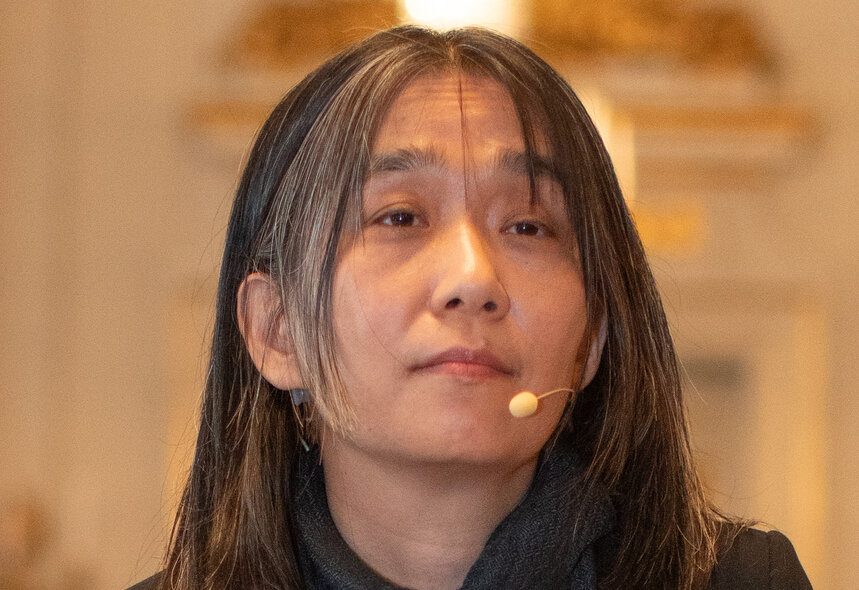
Deusdedit Kansiime on why we need a new incentive structure to support not-for-profit models in the publishing world
Publishing and the circulation of ideas, beliefs and knowledge - literary, scientific or otherwise - is absolutely instrumental in the social and economic development of the countries of the world.
Deus Kansiime
The winner of the 2024 Nobel Prize for Literature should draw our attention to the often-forgotten power of marginal publishing outlets in the Global South. As The Guardian put it, Han Kang’s Nobel win was ‘a triumph not only for Korean literature but also a reminder of the huge reach and influence of small press publishing’.
This is not just about romanticising the little over the might of the mainstream against whom it is fashionable to take populist swipes. Neither is it only about literary production. And Kang [pictured above], an author based in one of the world’s richest countries, might seem an unusual example for a kind of aspirational excitement about the global little. But, given the uneven distribution of symbolic and material capital on the world stage, her Global South location links her to the inspirational glimmers of our successful little.
Kang’s writing career was born, nurtured and matured in the shadowy world of small ephemeral publishing networks. Her first novel, The Vegetarian, was initially mediated through a network of indie publishers before its 2015 English translation – itself published by an indie house, the now defunct Portobello Books – won the Booker Prize that year, bringing international attention to the author.
That she soon charmed the Swedish Academy is both fascinating and instructive. By acknowledging Kang’s work, the very pinnacle of literary validation and acclaim recognises, perhaps unconsciously and indirectly, the blinding effect of the disproportionate flow of global capital, especially relating to knowledge production and cultural exchange, and puts a spotlight on what can be done about it. This might help us highlight the valuable, extractible learnings from the little manoeuvres of knowledge creation and content curation that manage, incredibly, to emerge in developing regions.
A vital part of the development process
Publishing and the circulation of ideas, beliefs and knowledge – literary, scientific or otherwise – is absolutely instrumental in the social and economic development of the countries of the world. Whether it is in the spheres of education, innovation, literacy, culture, creative industries and democracy, having functional and accessible publishing systems is a vital component in any development process.
But it is easy to miss – or worse still, dismiss – its centrality. And in an era where the ubiquity of the internet and its data circulatory systems has given writing and textual dissemination an illusion of seamlessness and unsophistication, yammering about the need for robust publishing systems might seem a little redundant.
On the contrary, it is precisely why we should care more about it, especially in present day Africa. If we look more closely at the activity of small, fractured and independent publishing streams on the continent, we cannot miss the potential it promises for keeping alive the production, flow and exchange of ideas, even in the face of limited economic resources.
A shadowy literary economy
My PhD project has exposed me to elements of this shadowy small press economy, how it operates and why it is of increasing importance in the 21st century. From Cassava Republic Press, Bookcraft and Farafina in Lagos to Kwani Trust and Story Moja in Nairobi, from Femrite, Ibua and Sooo Many Stories in Kampala to Weaver Press, ZWW and BWAZ in Harare, from Blackbird Books in Johannesburg to Arachne Press in Cairo, a huge wave of small independent publishers, less incentivised by profit, is making its mark.
The emergence of this shadowy economy is premised on the failure of commercial neoliberal models of production and consumption to sufficiently mediate cultural and creative industries, on the one hand; and, on the other, the huge desire by passionate creatives and aspirational cultural producers to share their talent, knowledge and skills with little or no financial expectations. Since market-led resource mobilisation is considered essential in all forms of production, big cultural brokers, gatekeepers and consecrators like multinational publishers, in the case of literature, tend to sidestep works from most of the global south due to commercial considerations. What remains is a vacuum on the literary scene, with its officialised properties left in a state of inertia and decline.
Valuing the marginal sanctuaries
Nevertheless, the creative energy of the local aspirational literati and the conscious reading public remains. This energy utilises non-commercial manoeuvres to be actualised in the form of published, disseminatable material that still pays due attention to aesthetic value, tastes and standard. This shadow system continues to reproduce a parallel ecology of practice. It functions as a sanctuary for endangered literary material, dialogue and producers, against a rather indifferent coterie of multinational giants of the global creative industry. We therefore need to harness this energy by supporting these small producers and acknowledging their role in filling the gap left by the failures of neoliberal economics. We need to value the writers and books that inhabit these marginal sanctuaries as much as we do those that sit at the high table of the mainstream.
Awarding writers like Kang the Booker or the Nobel Prize is a good starting point, but not the end of the road. Their recognition, consecration and validation mean a great deal. Nobody would be too modest to dismiss the prestige, even money, that accrues to the writer once they are bestowed with such honours. But more could be done. Let us, for instance, enable co-operative linkages between these sanctuaries and the mainstream, without the latter co-opting the former, as we have seen in the past. A new incentive structure to support not-for-profit models needs to be put in place and allowed to function alongside the commercial publishing streams. This way, a more diverse cultural space will be enabled.
*Deusdedit Kansiime [2022] is doing his PhD in English.
**Picture credit: Wikimedia commons.












